.
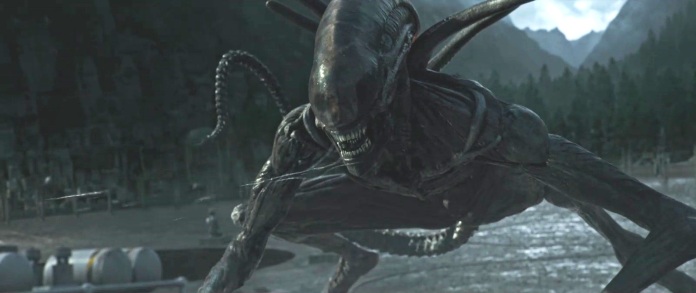
Director: Ridley Scott
By Roderick Heath
Ridley Scott’s chimera of horror and science fiction, Alien (1979) launched its director on a Hollywood career and established a franchise that has become a fixture of the modern cinema landscape. Expanded by James Cameron, David Fincher, and Jean-Pierre Jeunet, the Alien series, whilst declining steeply in quality as it went on and spawning an army of imitators, still managed to remain distinctive. That distinctiveness stemmed from the films’ unique blend of down-and-dirty generic imperatives, telling blood-and-thunder stories of rampaging monsters, obscene pregnancies and infestations, and raw survivalism, fused with high-class production values, conceptual intelligence, and technocratic grandeur, lending a veneer of respectability to a portrait of a future far less cheery and far more id-like than the norm for such spacefaring tales. This is a future defined by eerie fusions of biology and technology, painted in chiaroscuro contrasts of assailed light against overwhelming blackness, a place where nightmares dwell and heroes survive only by pure nerve. The series reached a nadir when the menace of the xenomorphs was pitched into combat with the hulking Predators of Twentieth Century Fox’s other beloved sci-fi action property for two readily ignored movies, but then Scott elected to return to the series that had made his name with Prometheus (2011). Suddenly the series, and its director, were exciting for many again. Prometheus proved a peculiarly indecisive concoction, however, and a divisive one.
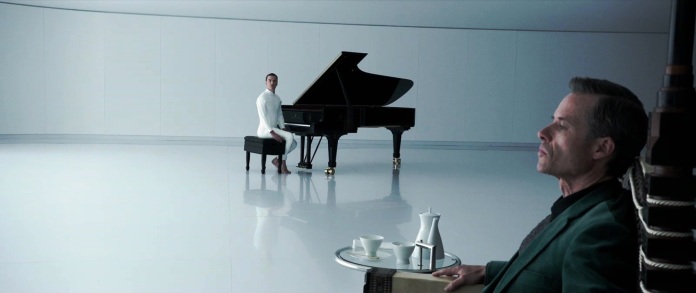
Undoubtedly, Prometheus was an ambitious and hefty piece of work. But many, including me, were hoping that Scott would extend his work not just in theme and scope but in style. The specific aura of his original, defined by a mood of miasmic dread and mystery, and tension slowly ratcheted then exploited with relentless effect, was attuned to environment as a tool and source of drama, in the twinned environs of space’s unknowable expanse and the labyrinthine twists of the Nostromo. Such carefully worked filmmaking offered lessons too many contemporary directors forget, including, it seemed, Scott himself. Still, Scott poured a great deal of his matured technical and storytelling expertise into the film and many examples of his great eye, so that when viewed as a standalone thrill-ride, Prometheus was a fine effort, sporting one truly classic sequence depicting an excruciating surgical birth. But as a revisit to beloved universe by its progenitor, it was surely more conventional and clumsy.
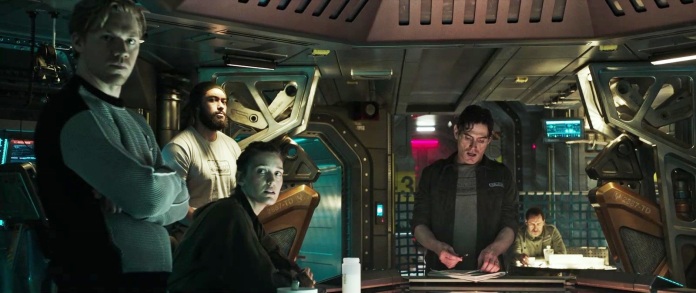
The curious squeamishness Scott revealed on Prometheus about drawing too many clear lines to his original gives way with Alien: Covenant, his latest foray into this zone, to a bolder reappropriation of his stylistic cues, opening the door for an instalment that moves a long way towards closing the linkage between the two entries. The titles recreate the assembling motif of the original’s opening credits, and Jed Kurzel’s music score quotes Jerry Goldsmith’s plaintive, eerie, barely-there scoring for the original. Scott also quotes ideas from subsequent entries, like a projected image of lovely forest offered as a bogus panacea for grief and the stern rifle-wielding quoted from Aliens (1986). There’s a deftly clever reason to this sort of conscientious trope-harvesting, beyond mere homage and service to a conceptual universe, that becomes clearer as the film goes on. Prometheus dealt with an expedition financed by dying tycoon Peter Weyland (Guy Pearce) and his efforts to track down the possible source of life on Earth, discovering facilities used for genetic engineering and the remains of a colossal alien race dubbed Engineers, who laid the seeds for the genesis of the human race but also intended its destruction and supplanting by more fearsome creations. The finale saw sole human survivor Elizabeth Shaw (Noomi Rapace) appropriating an Engineer spaceship to track down their home world in the mangled company of Weyland’s magnum opus in cybernetic engineering, David (Michael Fassbender).
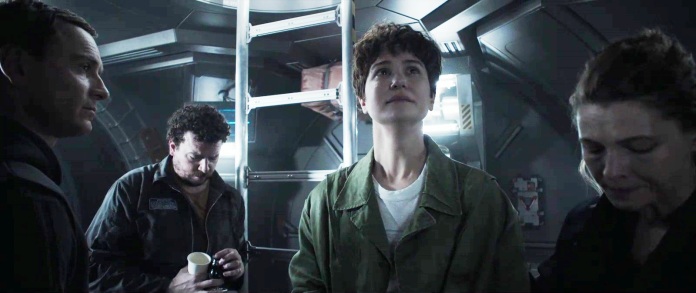
Alien: Covenant opens with a sequence depicting David’s first conscious moments as a creation and tool of Weyland, back when the creator was still relatively healthy and David was immediately faced with a quandary of being the perfect and undying progeny of a very frail beast indeed. Most of Alien: Covenant however takes place ten years after the events of Prometheus. Following Prometheus’ lead, Covenant is also the name of a spaceship, a craft carrying a load of 2000 colonists in cryogenic stasis to a distant planet chosen as a new home. Their well-being is overseen by the on-board synthetic human Walter (Fassbender again), an upgraded, less independent version of David’s make. In between leaps through wormholes with a solar sail deployed to recharge the ship’s power supplies, the Covenant is struck by a surge of energy from an exploding star, frying its electrical systems and causing the ship’s core crew to wake up. The captain, Branson (James Franco), is burned to a cinder when his stasis pod catches fire, leaving his partner Daniels (Katherine Waterston) distraught and his second officer Oram (Billy Crudup) in anxious command. Whilst repairing the solar sail, another crew member, Tennessee (Danny McBride), picks up an extremely faint and mysterious broadcast from a relatively nearby planet. Watching the broadcast, the crew realise it’s a faint image of a woman singing John Denver’s “Take Me Home, Country Roads.” When they look at the planet it’s sourced from, a mere seven weeks’ flight away, the crew decide it’s worth travelling there to search for the mysterious woman, because the planet appears to be a closer and superior place to set up their colony.

Arriving at the planet, the Covenant crew, who are mostly married or in relationships to better foster the colonial mission, leave a skeleton force to man the space vessel whilst most of the crew departs to the surface to investigate. Tennessee’s wife Faris (Amy Seimetz) is one joins the landing team, which also includes Oram, Daniels, and stalwart Lope (Demián Bichir, under-utilised), whilst her husband stays aboard ship with another couple, Upworth (Callie Hernandez) and Ricks (Jussie Smollett). Daniels has protested vociferously to Oram about his decision to come to this planet which she describes as too good to be true, a protest Oram registers as another slight against him, feeling a victimised status he blames on his oft-proclaimed religious faith. Touching down, the landing party soon find the planet apparently free of all animal life but weirdly rich in familiar, overgrown versions of Earth vegetation. They soon find a crashed Engineer spaceship and find Shaw’s dog tags on board. Two members of the party, Ledward (Benjamin Rigby) and Hallett (Nathaniel Dean) also inadvertently find something else, spore pods that release microbes that latch themselves on their bodies and soon start a gruesome and grimly familiar biological process. Both infected men soon fall ill, bleed copiously, and finally have small but deadly alien organisms erupt out of their bodies. These things grow and go on the hunt, leaving several crew dead and their shuttle craft destroyed. What’s left of the party is saved by a mysterious cloaked figure who releases a bright flare to scare the monsters off. This is soon revealed to be David himself, surviving a solitary existence on this planet with naught to do but pick up where the Engineers left off.

The early scenes of Alien: Covenant confirm Scott’s intention to reverse-engineer the series back to original specs, whilst also quietly stretching out sinew in readiness for hard exertions when they come, as he makes a film where its very status as a variation on a theme is an explicit part of the show. The workaday tedium that afflicted the denizens of the Nostromo is not quite rhymed with the more upbeat and expectant Covenant crew here, whose outlook is fixed on new horizons rather than hacky bonus cheques. This positive aspect to the crew makes them more harmonious and likeable for the most part, but also means most lack the hardened edge of survival instinct that finally sustained Ripley through to safe harbour. The crew’s increasingly panicky, frail responses to hard-charging survival situations comes both in response to sudden swerves of fate but also repeatedly create them. Daniels’ tragic loss of her partner which is also the loss of the expedition leader and pillar of stability has immediately punched a deep and ever-widening hole in the integrity of this unit. Oram cringes and privately fumes at presumed dissension to his authority, especially when the other members of the crew take pause during their repairs to give Branson a funeral. Tennessee becomes increasingly stressed and places the Covenant in danger from the violent storms that sweep over the planet’s upper atmosphere as he becomes increasingly worried about his wife.
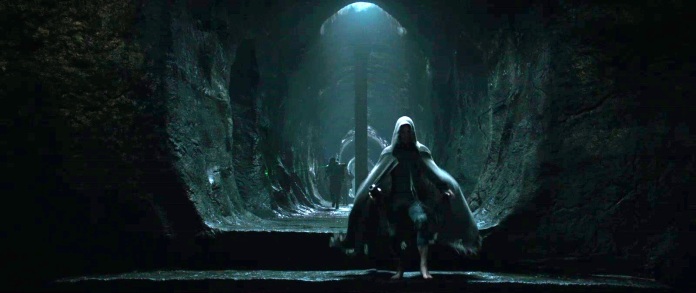
The way stressful and lethally intense situations sort out personalities, a minor but consequential theme of the original, is here revisited and becomes an overriding part of how Alien: Covenant investigates humanity and alienness as conditions. This aspect is illustrated with particularly ruthless zeal when the long, investigative first act gives way to rapidly spiralling crises and hysterical goads to action. The creature in Ledward rips its way out of his back whilst he and Oram’s botanist wife Karine (Carmen Ejogo) are in the shuttle craft’s med bay. Faris locks Karine in with the monster and makes a frenetic but ineffectual attempt to get a weapon and kill the creature. Although new-born the creature still gnaws Karine to death and tracks Faris through the ship, finally driving her to accidentally blow up the craft with her wild gunshots. Scott repeats this process several times, as situations fall suddenly and ruthlessly on his characters, a callous quality given fresh bite by the fact most of these characters are in relationships, their functions as team members cut across by personal loyalties and instincts driving them in contradictory directions.
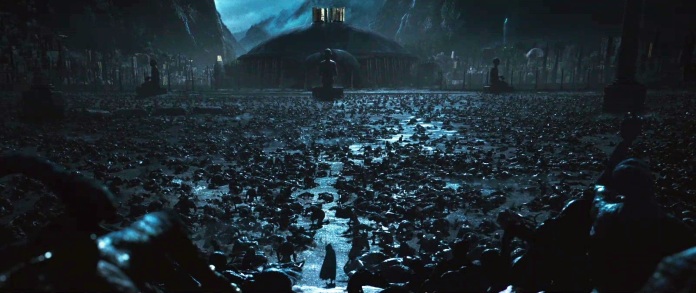
Daniels’ enveloping grief is employed both as a personal trait and an aesthetic keynote in a mad dream where everything spirals in towards to twinned moments of birth and death. Her hopes for building a log cabin on an alien shore with her husband are recited as pathetic confession, and she shares an embrace with Tennessee when they’ve both lost loved-ones. Scott contrasts the increasingly frenzied, messy, and desperate actions of the humans against the ever-poised David, who, in spite of his solitary Ben Gunn-like existence on the planet and long, ragged castaway’s hair, has kept his composure and found peculiar purpose. He takes the survivors in hand and leads them to a deserted city where the petrified remains of the Engineer race still lie scattered across agora cobbles, like some grotesquely apocalyptic, genocidal edition of Pompeii’s dead. David explains to the survivors that the Engineer ship he and Elizabeth brought to the planet accidentally released a sample of the Engineers’ own biological agents, killing them and all other animal life, whilst Elizabeth was mortally injured when the ship crashed.
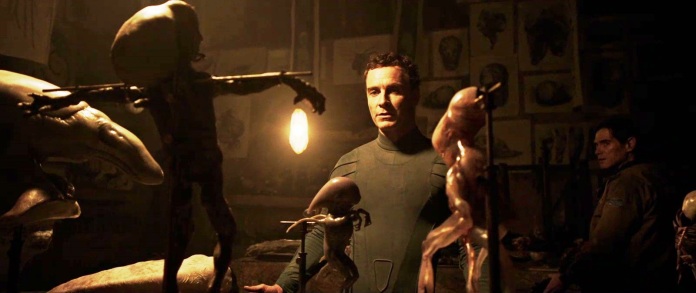
Although it has undoubtedly been composed of uneven individual works and has received little recognition, Scott’s late career has been rapidly taking shape as one of the most vital and interesting runs in recent cinema from a major filmmaker. This is apparent on both on the level of sheer cinematic swagger, replete with genre-swapping skin-changes worthy of his xenomorphs, but also in the way the key fascinations of his films have become increasingly compulsive. This phase began after the flop of Body of Lies (2008), probably Scott’s weakest film, and kicked off with Robin Hood (2010), both an attempt to recapture and to farewell a phase in his career defined by the success of Gladiator (2000), the movie which restored his standing as a major hit-maker but also reduced him to a spinner of simplistic fairy-tales for grownups. Robin Hood, although violently uneven and poorly focused, was nonetheless a complex conjuration, meshing closely observed historical context with mythology in a manner that highlighted several of Scott’s career-long concerns, particularly class conflict and the fate of the out-of-place individual, and the question as to how our contemporary humanity has evolved, in terms of one of Britain’s most famous folkloric figurations.
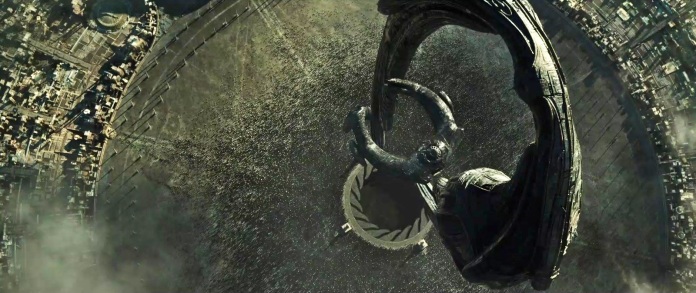
The films Scott has made since then – Prometheus, The Counselor (2013), Exodus: Gods and Kings (2014), The Martian (2015), and this one – have all agitatedly sorted and re-sorted an essential catalogue of ideas and images, taking on parables in various settings and each with a different tone for framework. The Old Testament punishments for hubris in Prometheus, The Counselor, and Exodus saw moral dramas played out in landscapes of jagged stone and bleak portent, whilst the communal efforts to achieve sanctuary in Exodus and The Martian evinced a positive but exacting sense of vulnerability in the face of eternal powers. Like Luis Bunuel, a very different filmmaker in obvious ways, Scott has explored his own contradictory nature as a person without overt religion but easily fired up by a religious sensibility, urgently examining the forces that make and break us, trying to live up to a humane creed but constantly offering sly sympathy to his Satanic figures.
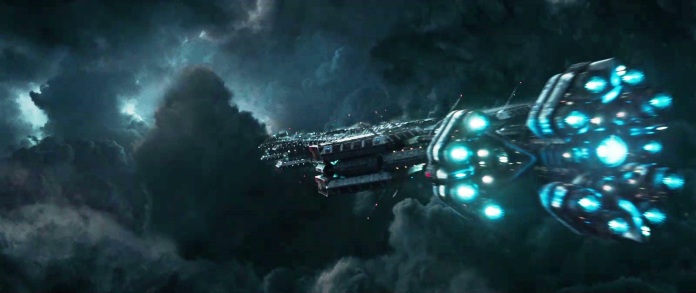
Alien: Covenant certainly extends this last aspect through the figure of David, who has slipped his bonds and become determined not merely to be excellent product but a most excellent and laborious producer. He’s that figure Scott admires most and has most qualms about, the exceptional being straining against a world of lessers, an antihero driven to be rebel archangel in his outrage at the way things are. Oram is a man of religious faith but little faith in himself and, more importantly, little gift for leadership, and he falls prey to David’s designs with tragicomic ease. The deliberate echoes and suggestions of direct connection provided here with Blade Runner (1981) flesh out something long implicit in the diptych offered by Scott’s most evergreen films, as David here marches on fearlessly into zones of self-definition Roy Batty could not quite bear to contemplate: he still wanted his father to tell him things would be all right. One forceful idea of Prometheus was the notion that discovering God might be a colossally disappointing act, underlined here with the revelation David casually exterminated the Engineers with their own works. One mask of creation simply gives way to another, leaving more mystery and more frustration. This becomes a spur ironically not to despair but to further, ever-more restless engagement with the act of creation itself. But the creation is only ever a mirror to the faults and strengths of what produces it, and David’s root programming error is suggested with a daisy chain of literary references that connects Lord Byron, Percy Shelley, and the latter’s wife Mary, as the Frankensteinian progeny plans an elaborate and cosmically terrifying revenge on having been made so well and yet so impotent. His recitation of Percy’s epistle to the titanic urge, “Ozymandias,” reveals his own trunkless legs by misattributing it to Byron – a mistake Walter, seemingly David’s perfect replica, but carefully castrated by a more cautious and circumspect society, notices, the one clue that this would-be god is cracked.
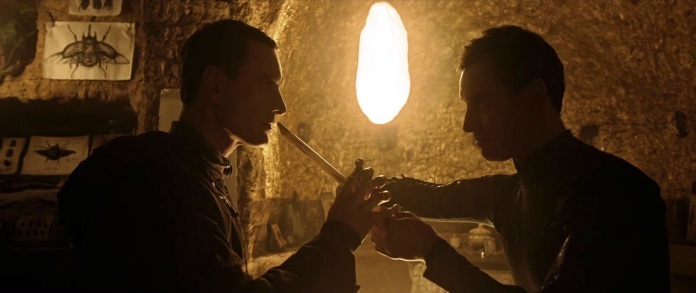
The relationship between David and Walter is one of Alien: Covenant’s most sublime ideas, giving Fassbender a chance to give two supremely confident, carefully varied performances, and the ultimate actor’s challenge and fantasy, to enact both seducing himself and killing himself. David introduces Walter to the pleasures of personal artistic creation when he teaches him to play a flute, the perfect Narcissus eventually even kissing his double in his effort to find a worthy companion in his solitude, and what could be more worthy than himself. But Walter resists and eventually becomes the only real force standing between David and victory over the pathetic flesh-bags. David has become as central and eclipsing to Scott’s re-conception of this franchise as Peter Cushing’s similarly cool, incisive, utterly unrelenting Frankenstein was to Hammer’s series about the character, towering far over the monstrous by-products of his tinkering. The eventual battle between the two synthetics is the ultimate and perfect version of the essentialist struggle that Scott has meditated upon as far back as the inevitably titled The Duellists – at last the mirrored antagonists are actually, truly identical, distinguished only by the mysterious code called personality. Alien: Covenant eventually unveils another inspired notion as it reveals that the missing link between the Engineers’ parasitic monstrosities and the familiar xenomorphs of the series is David himself, toying with these in his attempts to build a species perfectly adapted not just to survival but to actively exploiting and destroying humans.

This provides an impishly clever explanation for why the xenomorphs seems at once so strange and so familiar, compositing animal types found on Earth and giving the Engineers’ brilliant but mutable creations a new spin. At one point David acidly refers to one of his human male victims as the intended mother of one of his children. David has become in word and deeds his own god, a version of god blazing hatefully out of gnostic texts and bitter agnostic fantasy, a mad designer perched over neo-medieval texts splicing together misbegotten demons. The film’s blackest joke involves two renditions of a passage of Wagner’s Das Rheingold depicting gods entering Valhalla, and is also a cunning call-back to a motif again mooted in the original, where Ash celebrated the purity of the alien beast with ardent fascist admiration. The Hitlerian dream is unbound and now written into the music of the spheres. Appropriately, Alien: Covenant is a mad scientist’s concoction itself, all mediated by Scott’s utilisation of David’s urge to creativity as a metaphor for his own, speeding through drafts, each one tossed off with ever-more feverish drive than the last no matter how good or how lousy the results; only the urge to keep moving counts. Thus Alien: Covenant is a highly perverse hymn to creativity as a natural law and urge, manifesting in whatever form it will. Scott’s professional drive to keep working, so often the source of critical suspicion of his output, is constituted by him as the essence of his being.
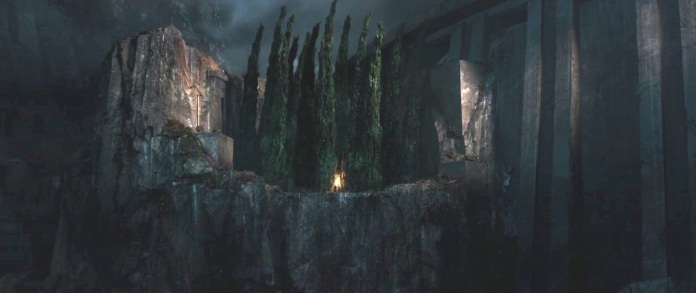
Scott does more than make a horror film here; he makes a film about the horror genre, its history, its place in the psyche, analysing the way the death-dream constantly underlies all fantasies of ego and eros. Scott reaches out for a hundred and one reference points, some of the already plain in the Alien series lexicon. The deserted Engineer city recalls the Cyclopean confines of the lost cities in Lovecraft tales like At the Mountains of Madness, the Elder Gods all left gorgonized by David’s perfidy. At one point Scott recreates Arnold Böcklin’s painting “Isle of the Dead,” an image that obsessed H. R. Giger, the crucial designer behind so much of the Alien mythos, as much as it did Val Lewton, whose cavernously eerie psychological parables redefined horror cinema in the 1940s; Scott no doubt has both in mind. David’s “love” for Elizabeth, which has taken the form of relentlessly exploiting her body to lend genetic material to his creations, is both reminiscent of a particularly tactile serial killer worthy of Thomas Harris and of the obsessive, invasive eroticisation of the loved one’s cadaver found in Poe, whilst the whole meditates as intensely and morbidly on its landscape of Poe’s poetry.

The design of the failed prototype xenomorphs and David’s rooms hung with sketches reminiscent of medieval alchemic ephemera both pay tribute to Guillermo Del Toro’s films and also poke Del Toro’s oeuvre back for its own debt to Scott and Giger. A head floating in water comes out of Neil Jordan’s self-conscious unpacking of fairy tales, The Company of Wolves (1984). The touch of Captain Branson’s death struck me as a possible tip of the hat to Dark Star (1974), in which the captain had died in similar circumstances, and which was of course made by Alien co-writer Dan O’Bannon. Late in the film Scott stages a shower sequence that sees Upworth and Ricks having a hot and steamy moment under the spigot only to be surprised by a xenomorph. At first glance this sequence revels in a trashier brand of horror associated with 1970s and ‘80s slasher films, but Scott also adds self-reference – the xenomorph’s tail curling in demonic-penile fashion around their legs calls back to the similarly queasy shot in Alien when Lambert was attacked by the monster, whilst also nodding back to Hitchcock and Psycho (1960). It’s staged meanwhile with all the pointillist precision of Scott’s most fetishistic visual rhapsodies – spraying water like diamonds playing over soft flesh, fogged glass, grey knobbly alien skin, and the inevitable rupture of red, red blood.
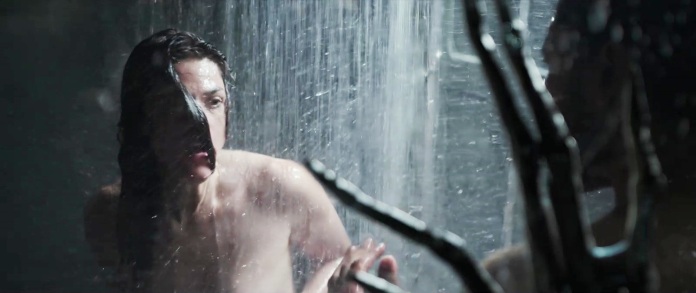
Which points to another quality of Alien: Covenant – its deeply nasty, enthusiastic commitment to being a horror film, an anarchic theatre of cruelty and bloodlust barely evinced in any other film of such a large budget, especially in this age of gelded adolescent fantasies. If it’s still not the deep, dank leap into a barely liminal space like the original, it is perfectly confident in itself and bleakly poetic in unexpected ways. I don’t know if a film has ever been so casually beautiful even when deploying visions of hellishness, apparent in moments like the shower attack. Or in the following scene when a blown-out airlock results in air turning to million-fold vapour pellets and then ice, exploding in dazzling shards. Or in the surveys of the desolate sculpture garden that is the Engineer city. Daniels’ resemblance to Ripley, in her short dark hair and singlets and pluck in the face of monstrous adversity is both another purposeful echo and a miscue, a by-product of Alien: Covenant’s status as a logarithmic variant. Her embrace with Tennessee is one of the most unaffectedly humane moments in Scott’s oeuvre, and a summation of the film’s repeated statement that to be alive is to need others. Only that’s a rule that cuts both ways in a predatory competition for lebensraum, and leads to such fragments of ecstatic insight as David’s distraught look when one of his children fails.
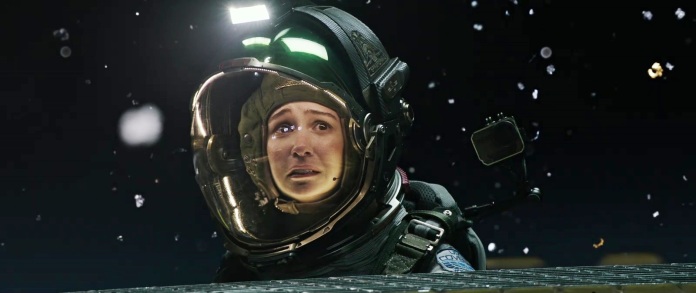
Scott stages another brilliantly executed, madcap suspense sequence as Daniels and Tennessee attempt to flee the planet surface with a xenomorph scuttling around the hull of their craft, Daniels trying to blast the beast on a wildly pitching deck as the monster tries to head-butt its way through Perspex to get at Tennessee. There’s a skittish quality to Pietro Scalia’s editing throughout the film that communicates the off-kilter will at the heart of this project. Only in its very last act does some of Alien: Covenant’s assurance slip, as Scott doesn’t quite match the patience with which he deployed his sneak-attack coda in the original. But there’s still a final twist in store, at once galling and perfectly apt, deployed with obviousness but sustained in ambiguity with such malign showmanship that it becomes increasingly vexing and entirely riveting, before the axe finally falls.
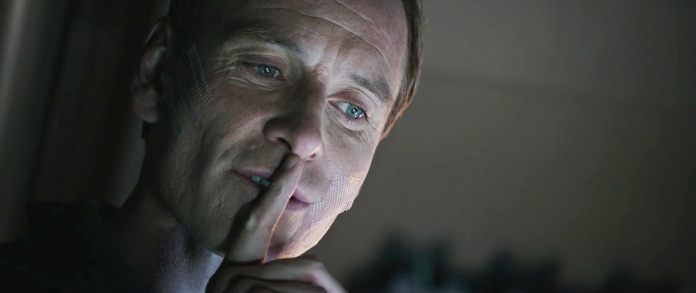
Scott builds with cold mirth to a punch-line for the tale that both echoes one he initially mooted for Alien, and which also recalls the sting in the tail of one of the signal influences on that film, Mario Bava’s Planet of the Vampires (1966). Scott exploits his own well-worn material here to push right to the brink of the abyss in a way reminiscent to what he did before in The Counselor, complete with a note of predetermined evil fate, only in a context where he can bait people to swallow it. But he also leaves a tantalising question open that might still be answered in creative and thrilling ways. This is the worthy achievement of this entry – it rejuvenates a well-worn property and restores all its dark and unexpected power. But more than that, it’s a testament of pure delight in his medium from a filmmaker who really has nothing left to prove, but likes to prove it anyway.

This may be some of your finest writing that I personally have read, Roderick. Thanks for sharing. The initial impact Covenant had on myself was as a violent deconstruction of Romantic aesthetic theory, as the Sublime and the heroic reading of Milton’s Lucifer comes alive to devour the New World narrative. Add in a dash of Noah’s Ark and Cain and Abel to keep up that perverse manipulation of Christian iconography from Prometheus.
Your observations have added greatly to my own reading of the film now, particularly your insights into the meta-figuring and wrestling of Scott’s creative process itself. You’re right on. It was only in rewatching some of Scott’s recent work that I realized, like you point out, that this late phase of Scott’s career has really been one of astonishing creative abandon, and he’s done it flying somewhat under the radar. Great stuff.
This film contains multitudes, and I’m looking forward to giving it a second viewing. Thanks for opening up new avenues to approach it from.
LikeLike
Best review of Alien Covenant that I’ve read. Bravo! This movie has layered themes and it deserves this kind of review. There aren’t very many films that inspire original thought in people by tapping into deeper universal meanings. The Shining, The Wailing (Korean), and Metropolis are examples. This science fiction film is one of them. I’ll often stop watching a movie because so many of them are poorly done, but I’ll go see this one a couple more times.
LikeLike
Hi Eric, Patrick. Thanks for the good word guys and I’m glad we agree on the movie. It’s not the first film I’ve enjoyed this year but is the first one that’s properly excited me, all the more surprising given how mined out this seam should be. Instead, it’s an embarrassment of riches. One train of thought I found myself contemplating the nature of auteurist late careers (and I know calling Scott that is in itself controversial) and I realised that the reason many filmmakers lose traction with critics or audiences or both in that phase isn’t so much because that they lose their mojo or whatever, but because as they’ve told many stories they adopt a different attitude to them, and the viewer gets as much out of such works as they’re able to bring to it just like the director. The same thing is just as true for 7 Women or Rio Lobo as it is for this. And, as you say Patrick, it’s executed with such panache. Real panache, not that efficient slickness that’s everywhere at the moment.
LikeLike
Appreciate the neat comparison with Roy Batty.
LikeLike
I cracked up when David made the link palpable by saying, “That’s the spirit!”
LikeLike
Great movie, great review. Congratulations, Roderick.
LikeLike
Thanks, André. Glad we’ve agreed on this one.
LikeLike
One of the best analyses of the film that I’ve read. Absolutely excellent. You get it.
LikeLike